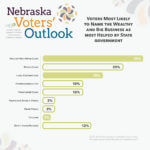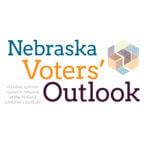 The Nebraska Voters’ Outlook is a statewide public opinion research initiative measuring Nebraskans’ thoughts on a cross-section of state policy and issues impacting children and families in Nebraska. The poll is conducted by the independent polling firm targetsmart. Full results are available here.
The Nebraska Voters’ Outlook is a statewide public opinion research initiative measuring Nebraskans’ thoughts on a cross-section of state policy and issues impacting children and families in Nebraska. The poll is conducted by the independent polling firm targetsmart. Full results are available here.
The results reveal strong majorities of Nebraskans identify ‘making healthcare affordable and accessible’ (70 percent); ‘lowering property taxes’ (64 percent); and ‘fully funding K-12 public education’ (61 percent) as top policy proposals that would be most helpful to them, and their families.
High Property Taxes Linked to Lack of State Education Funding, Not Overspending by Local School Districts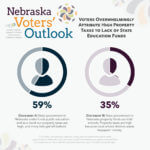
“Most notably results show Nebraskans strongly link high property taxes to lack of state education funding (59 percent), instead of overspending by local school districts (35 percent),” said Hadley Richters, Holland Children’s Institute CEO. “And with this understanding, a majority of Nebraska voters favor fully funding public education (51 percent), over tax cuts for businesses and property owners (45 percent).”
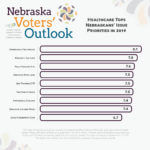 Affordable and Accessible Healthcare is Nebraskan’s Top Priority
Affordable and Accessible Healthcare is Nebraskan’s Top Priority
“Another highlight in the data reveals an overwhelming majority (70 percent) of Nebraskans rank ‘making healthcare affordable and accessible’ top among policy proposals that would be most helpful to them,” said Richters. “So, it’s not surprising to find a large majority (56 percent) of Nebraskans are also ‘concerned’ or ‘very concerned’ with Governor Ricketts’ additional restrictions and delay on the implementation of Medicaid expansion, and only 28 percent say they are ‘not at all’ concerned with the Governor’s response on the expansion of Medicaid.”
More Early Childhood Investments and Affordable College
Survey results also showed nearly six-in-ten voters (58 percent) support increasing state investment in early childhood 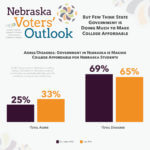 development. Yet, 50 percent of Nebraskans disagree that state government is making adequate investments in early childhood care and education. Additionally, voters continue to be disappointed with state performance on the affordability of higher education, with a vast majority (86 percent) believing the state should do more to increase college affordability to the middle class, and 70 percent describe the state’s performance in this area as “fair” or “poor.”
development. Yet, 50 percent of Nebraskans disagree that state government is making adequate investments in early childhood care and education. Additionally, voters continue to be disappointed with state performance on the affordability of higher education, with a vast majority (86 percent) believing the state should do more to increase college affordability to the middle class, and 70 percent describe the state’s performance in this area as “fair” or “poor.”
State Government Helps Wealthy the Most
When respondents were asked who state government helps the most, consistently a large majority say government most helps big corporations (65 percent), and the wealthy (61 percent). Only a small minority of Nebraskans (28 percent) believe state government currently helps them and their families ‘a lot, or fair amount.’
The Nebraska Voters’ Outlook continues to show that Nebraskans agree on the policy priorities. However, Nebraskans make clear that the state government is not adequately addressing their priorities and the issues most beneficial to them and their families. As policy decisions impacting children and families continue to receive broad support, Nebraska policymakers must understand public viewpoints on both priorities and problems, and respond accordingly.
